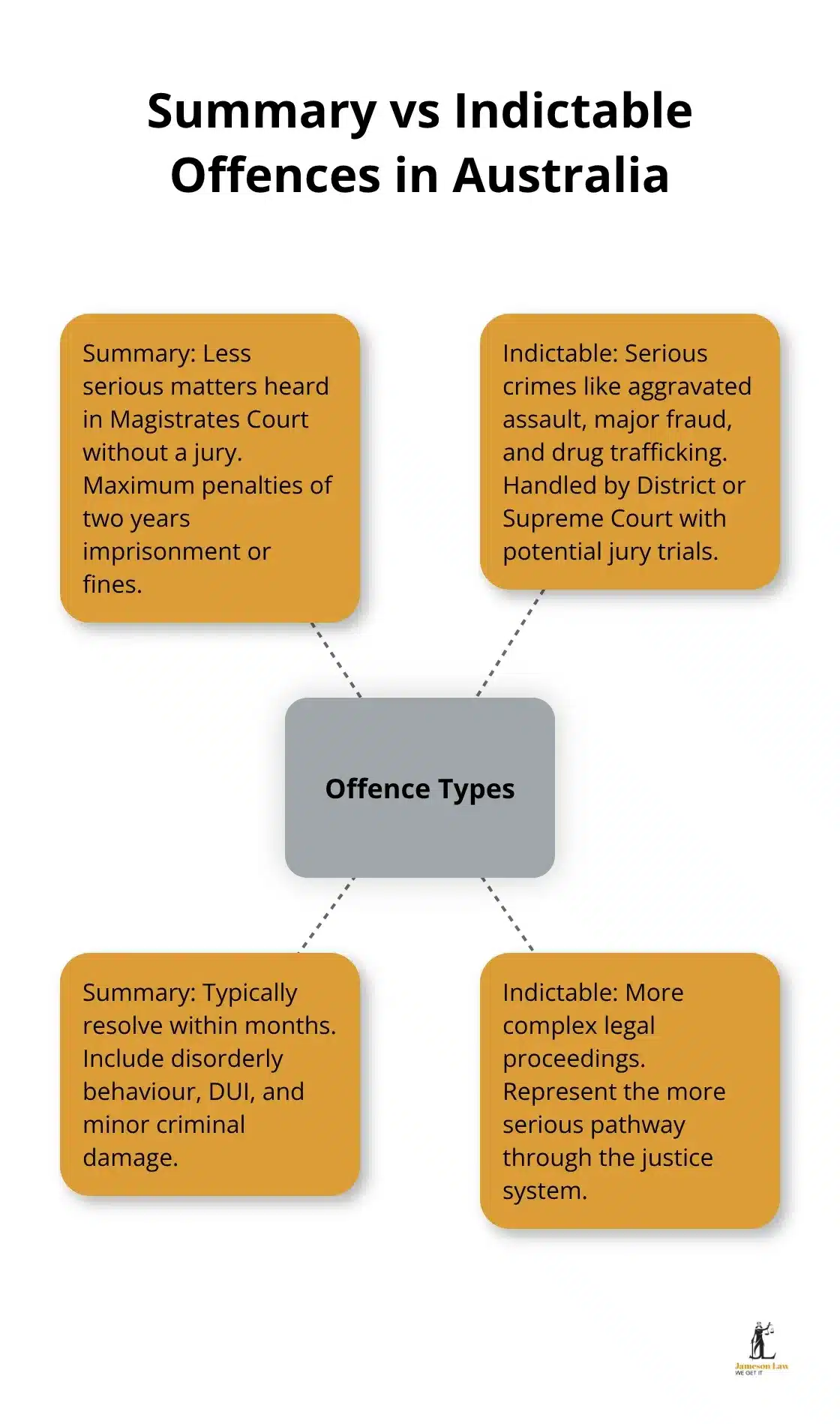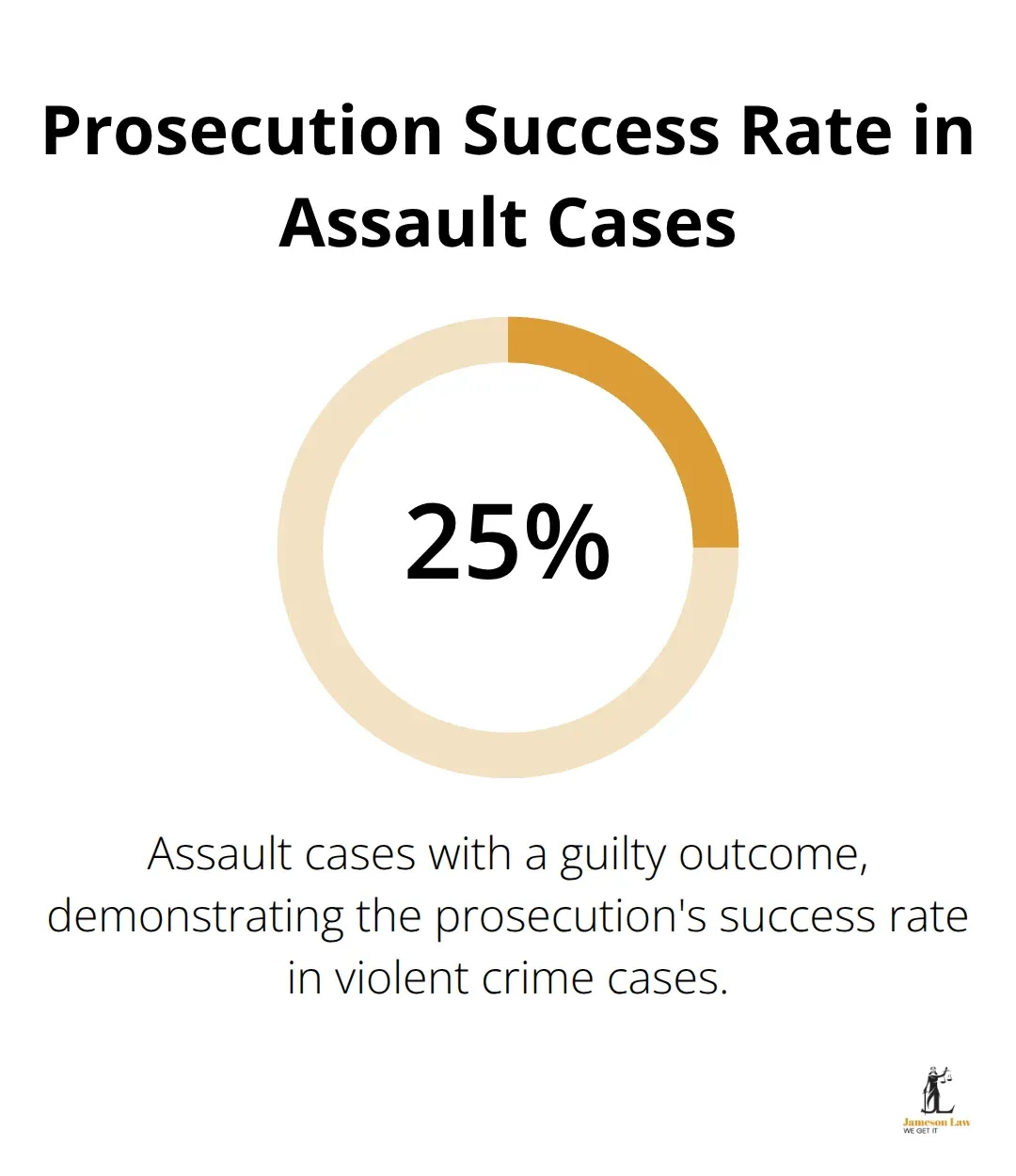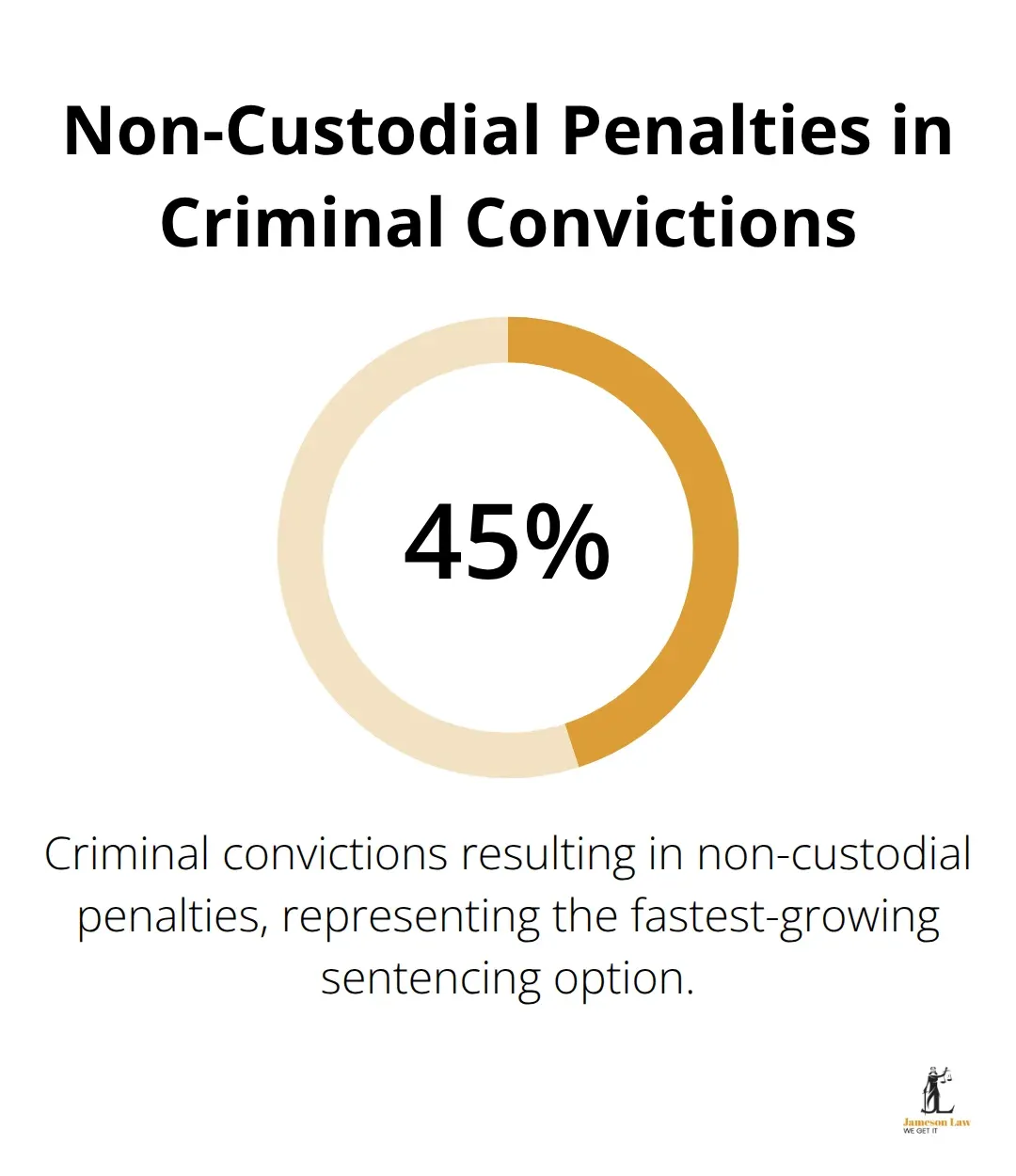Australia’s criminal justice system categorises offences through distinct criminal law types that determine how cases proceed through court. Each classification carries different penalties and procedural requirements.
We at Jameson Law see clients navigate these complex legal distinctions daily in Sydney and across NSW. Understanding these categories helps defendants and their families prepare for what lies ahead in the criminal justice process. For help now, call (02) 8806 0866 or see our guide to NSW criminal court procedures.
How Are Criminal Offences Classified in Australia
Summary Versus Indictable Distinctions
Australian criminal law uses a two-tier classification that directly affects how your matter runs in court. Summary offences are less serious and are heard in the Magistrates or Local Court without a jury. Typical examples include disorderly behaviour, driving under the influence, and minor property damage. These cases usually resolve within months and can carry fines or imprisonment up to two years. See the NSW Local Court criminal and traffic overview.
Indictable offences cover serious crimes such as aggravated assault, major fraud and drug supply or trafficking. These are heard in higher courts and may involve a jury. Learn more about the District Court of NSW and the Supreme Court of NSW.

Commonwealth Powers Versus State Jurisdiction
Jurisdiction matters. Commonwealth offences include tax evasion, immigration matters, cybercrime and drug importation, prosecuted under federal law and heard in state courts exercising federal jurisdiction. Penalties for some federal drug importation offences reach life imprisonment. By contrast, state offences include assault, theft, driving offences and domestic violence, determined under state legislation in the NSW courts. A similar act can attract different charges and maximum penalties depending on whether it infringes federal or state law. For a practical overview of process steps, see what happens in criminal matters.
Court Hierarchy and Offence Severity
The court you appear in reflects the seriousness of the charge. The Local Court handles summary offences and some minor indictable matters (heard summarily). The District Court hears serious indictable offences like major fraud, serious assaults and drug trafficking. The Supreme Court deals with the most serious crimes such as murder and large-scale commercial crime. Court level affects procedure, timeframes and sentencing exposure. If you need advice about bail at any stage, visit our page on bail applications.
These classifications lay the groundwork for how a criminal matter moves through the system and what penalty range and strategy might apply in your case.
What Criminal Offences Face the Harshest Penalties
Violent Crimes Carry the Highest Maximums
Violent crimes attract the heaviest sentences. In NSW, murder carries a maximum penalty of life imprisonment, while manslaughter carries a maximum of 25 years. National figures for court outcomes are tracked by the Australian Bureau of Statistics. Within assault offences, consequences vary widely. For example, causing grievous bodily harm with intent can carry a maximum of 25 years, whereas common assault has far lower maximums.

Property Crime Penalties Scale With Value and Circumstances
Property offences cause significant economic harm. Aggravated break and enter or home invasion attracts heavier penalties than simple shoplifting. Sentencing turns on value, planning, vulnerability of victims and any violence used. Where appropriate, courts may order restitution or compensation. If your charge involves a sequence of alleged thefts or dishonesty, our team can advise on appeal options after sentence.
White Collar Crime and Cybercrime
Financial crimes can result in lengthy prison terms commensurate with loss and breach of trust. Regulatory guides set out consequences for tax-related offences; see the ATO’s page on penalties for false or misleading statements. Cyber-enabled offences are a continuing focus for law enforcement. For prevention and reporting, visit the Australian Cyber Security Centre. If you face allegations involving complex data or finance, early strategy on evidence and expert input is crucial; see our sentencing advocacy guide.
How Do Courts Determine Criminal Penalties
Maximum Penalties Reflect Crime Severity
Parliament sets statutory maximum penalties for each offence. These caps frame the court’s task. Murder carries life imprisonment, manslaughter up to 25 years in NSW and Victoria, aggravated robbery up to 20 years, while minor theft typically attracts far lower maximums. See an overview of maximums from the Sentencing Council.
Drug supply and trafficking penalties escalate with quantity and context. In NSW, guidance is set out in the Judicial Commission’s bench book for the Drug Misuse and Trafficking Act. “Commercial” and “large commercial” quantities attract very substantial maximums.
Judicial Discretion Shapes Actual Sentences
Within those ranges, courts weigh factors such as prior record, harm, intent, remorse and prospects of rehabilitation. Early guilty pleas can reduce sentence through the NSW Early Appropriate Guilty Plea scheme. Victim impact statements are considered, particularly in violent crime. For a step-by-step look at appearances and submissions, see our guide to court procedure in NSW.
Non-Custodial Options Avoid Prison Time
Courts often impose community-based orders where risk can be managed. These include community correction orders, intensive correction orders, supervised bonds and fines. Home detention with electronic monitoring may be available for suitable non-violent offenders. For broader sentencing options, the ABS and state justice agencies publish regular outcome data, and you can discuss tailored strategies with our team. Where domestic violence is alleged, strict conditions can apply; read more on how criminal cases run.

Final Thoughts
Criminal law types and classifications matter. Whether your charge is summary or indictable, federal or state, and which court hears it, all influence tactics and outcomes. Consequences extend beyond immediate penalties to employment, travel and professional licences. If police have contacted you, do not guess your next step. Speak with our criminal defence team in Sydney for clear, practical guidance on bail, plea strategy, sentencing and appeals.
Early legal intervention often makes the difference between prison and community-based outcomes. Contact Jameson Law on (02) 8806 0866 for a confidential consultation.













